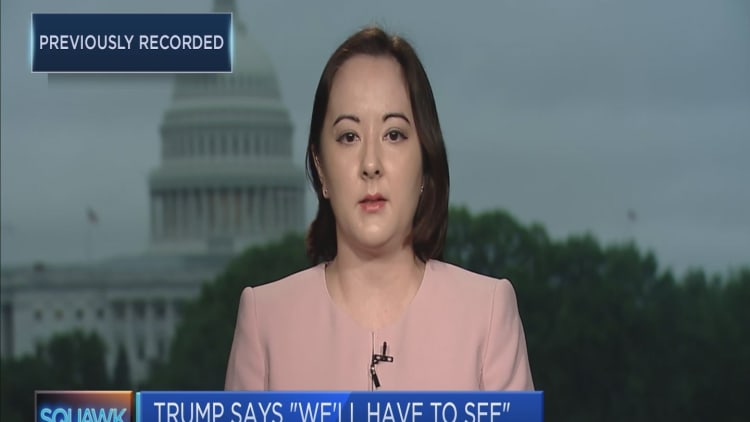Next month's milestone summit between North Korea's Kim Jong Un and President Donald Trump has major implications for China, which has geopolitical and security interests at stake on the Korean Peninsula.
"Lurking in the background as a potential spoiler or helper in this drama is Chinese leader Xi Jinping, who sees both opportunity and peril," Fred Kempe, president and CEO of foreign policy think tank Atlantic Council, wrote in a recent note.
The world's second-largest economy has long supported a nuclear-free region but strategists say its greatest priority is preventing North Korean regime collapse — if the rogue state falls under the weight of sanctions, that could send a flood of citizens to China.
For Beijing, "the right sort of peace deal could weaken the U.S. alliance with South Korea, reduce the threat of conflict and refugee flows on Chinese borders, and ultimately lead to the withdrawal of American troops from South Korea," said Kempe.
Ending the U.S. military presence in South Korea — a major prerequisite for Kim's administration to relinquish nuclear weapons — is expected to boost China's goal of minimizing America's influence in Asia.
What China wants
Beijing and Pyongyang ultimately possess the same goals for the June 12 summit: get the White House to relax sanctions on the isolated nation, according to Gregory Kulacki, a China expert at the global security program of research and advocacy group Union of Concerned Scientists (UCS).

"China and North Korea have cut their deal already," Kulacki said on a UCS podcast last week. That deal entails Xi's administration resuming some economic relations with Kim's government if the latter freezes missile and nuclear weapons tests, he explained.
But "in order for China to open the economic door a little bit, there is going to have to be some relaxation of those sanctions, which means there's gonna have to be some concession from the United States," Kulacki continued, adding that such a scenario would constitute a victory for both Pyongyang and Beijing.
During a meeting between Kim and Xi earlier this month — their second visit in recent weeks — the Chinese leader re-emphasized support for North Korea to stick to denuclearization while Kim was quoted as telling Xi that Pyongyang won't need to possess nuclear weapons if a "relevant party" drops its "hostile policy and security threats," evidently referring to the U.S.
Shortly following that encounter, Trump said Kim was possibly being influenced by Xi. And this week, the U.S. president urged China to maintain a secure border with the pariah state.
Ideally, China's outcome for the June 12 meeting is for "a soft landing," i.e. "a denuclearized North Korea that gradually carries out reform and opens up its society, which will make economic dynamism in the sub-region possible," said Ren Xiao, professor of international studies at Shanghai's Fudan University.

What China doesn't want
The Communist Party may be wary about the prospect of a reunified Korea — If the North and South were to unify, the new state could end up under U.S. influence.
"If Trump navigates too well, China could be confronted with a stronger, larger and ultimately reunified Korea as a regional, democratic bulwark and U.S. ally," Kempe warned.
A "worst-case peace deal" for Beijing would be if the U.S., South Korea and North Korea were to form some kind of group or alliance, Xiao echoed. But "that's quite unlikely," he added.

